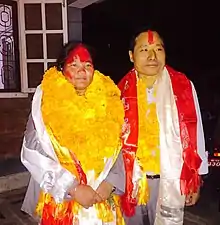Barsaman Pun | |
|---|---|
वर्षमान पुन | |
 Barsaman Pun with his wife Onsari Gharti Magar | |
| Minister for Energy, Water Resources and Irrigation | |
| In office 16 March 2018 – 25 December 2022 | |
| President | Bidhya Devi Bhandari |
| Prime Minister | KP Oli |
| Preceded by | Mahendra Bahadur Shahi |
| Succeeded by | Top Bahadur Rayamajhi |
| Minister for Finance | |
| In office August 2011 – March 2013 | |
| Prime Minister | Baburam Bhattarai |
| Succeeded by | Shankar Prasad Koirala |
| Minister for Peace and Reconstruction | |
| In office 14 February 2011 – April 2011 | |
| Prime Minister | Jhalanath Khanal |
| Preceded by | Rakam Chemjong |
| Succeeded by | Bishwonath Shah |
| Member of Parliament, Pratinidhi Sabha | |
| Assumed office 4 March 2018 | |
| Preceded by | Krishna Bahadur Mahara |
| Constituency | Rolpa 1 |
| Member of Constituent Assembly | |
| In office 28 May 2008 – 28 May 2012 | |
| Preceded by | Sushila Nepal |
| Succeeded by | Udaya Shumsher Rana |
| Constituency | Lalitpur 1 |
| Personal details | |
| Born | 1 June 1971[1] Jangkot, Rolpa |
| Political party | CPN (Maoist Centre) |
| Spouse | Onsari Gharti Magar |
Barsaman Pun, also known by his nom de guerre Ananta, is a Nepali communist politician and former Minister for Energy, Water Resources and Irrigation. He is also a member of the Standing Committee in Nepal Communist Party (NCP). He has previously served as Minister of Finance and Minister of Peace and Reconstruction.[2] He was a leader of the Communist Party of Nepal (Maoist-Centre) during the insurgency period and served as one of 4 deputy commanders of People's Liberation Army.[3]
Insurgency
He commanded the attack on Holeri police station on February 13, 1996, which marked the beginning of the civil war.[4] He was appointed as Eastern divisional commander following the 2002 central committee meeting.[5] Some of the battles he commanded in this capacity include the attack at Bhiman, Sindhuli in September 2002 which led to the death of 49 policemen and the attack on Bandipur barracks in May 2005.[6] He was appointed as a deputy commander of People's Liberation Army at the Chunbang conference in 2005.[7]
Political career
Following the Second People's movement and Comprehensive Peace Accord, Pun transitioned into politics. He was elected to the first Constituent assembly from Lalitpur-1. He contested the second Constituent assembly from Morang in line with the party policy of top Maoist leaders to contest the election from the Terai belt. However, he came in third place behind then Congress District Chairman Dik Bahadur Limbu and CPN-UML candidate Ghanashyam Khatiwada. He contested the 2017 House of Representatives election from his home district, Rolpa, and was elected to Parliament.
MCC Compact
MCC began developing the compact at the request of Nepal[8] in 2012 when Baburam Bhattarai was prime minister and Barsaman Pun was finance minister of Nepal.[9]
The compact was taken to parliament for ratification on 15 July 2019 when KP Sharma Oli was prime minister and Barsaman Pun was energy minister of Nepal.[10]
Electoral history
2008 Constituent Assembly election
Lalitpur - 1[11]
| Party | Candidate | Votes | Status |
|---|---|---|---|
| Communist Party of Nepal (Maoist) | Barshaman Pun | 15,329 | Elected |
| Nepali Congress | Udaya Shumsher Rana | 14,011 | Lost |
2013 Constituent Assembly election
Morang - 9
| Party | Candidate | Votes | Status |
|---|---|---|---|
| Nepali Congress | Dik Bahadur Limbu | 15,202 | Elected |
| CPN (UML) | Ghanashyam Khatiwada | 12,989 | Lost |
| Unified Communist Party of Nepal (Maoist) | Barshaman Pun | 8,525 | Lost (3rd) |
2017 House of Representatives Election
Rolpa[12]
| Party | Candidate | Votes | Status |
|---|---|---|---|
| Communist Party of Nepal (Maoist Centre) | Barshaman Pun | 42,084 | Elected |
| Nepali Congress | Amar Singh Pun | 20,337 | Lost |
Personal life
He is married to Onsari Gharti Magar, a fellow communist politician and former speaker of the Legislature-Parliament.[13]
References
- ↑ संघीय संसद सदस्य, २०७४ परिचयात्मक पुस्तिका [Federal Parliament Members 2017 Introduction Booklet] (PDF) (in Nepali). Nepal: Federal Parliament Secretariat. 2021. p. 270.
- ↑ Kharel, Pranab (4 September 2011). "PM Bhattarai swears in 13 more Cabinet members". www.ekantipur.com/. Retrieved 18 October 2015.
- ↑ Ogura, Kiyoko. "Meeting Pasang in Rolpa". Nepalitimes. Kunda Dixit. Retrieved 22 August 2020.
- ↑ Pun, Kiran. "Woeful tale of former commander". Republic. Binod Gyawali. Retrieved 22 August 2020.
- ↑ "Nepal's Maoist: Their Aims, Structure and Strategy" (PDF). International Crisis Group. Retrieved 24 August 2020.
- ↑ "One year of Qualitative Military Leap". OHCHR. OHCHR. Retrieved 24 August 2020.
- ↑ "बर्षमान पुन 'अनन्त' : सैन्य ईन्चार्जदेखि उर्जा मन्त्रीसम्म". Nepalpatra. 17 April 2018. Retrieved 23 August 2020.
- ↑ "MCC IN NEPAL, Top Ten Facts". U.S. Embassy in Nepal. 17 January 2020. Retrieved 16 September 2021.
- ↑ Editorial. "Challenge of the millennium". Retrieved 16 September 2021.
- ↑ "एमसीसी टेबल गर्न सभामुखलाई भनिसकेको छु : प्रधानमन्त्री देउवा". ekantipur.com (in Nepali). Retrieved 18 February 2022.
- ↑ Salokya (30 October 2013). "भक्तपुरमा ६२ र ललितपुरमा १०७ जना हार्ने निश्चित". Mysansar. Shrestha, Umesh. Retrieved 22 August 2020.
- ↑ "Rolpa : Province 1 – Nepal Election Latest Updates and Result for Federal Parliament". Kailash Sirohiya. Retrieved 22 August 2020.
- ↑ "Onsari elected First Woman Speaker". The Kathmandu Post. Archived from the original on 6 October 2016. Retrieved 9 November 2015.